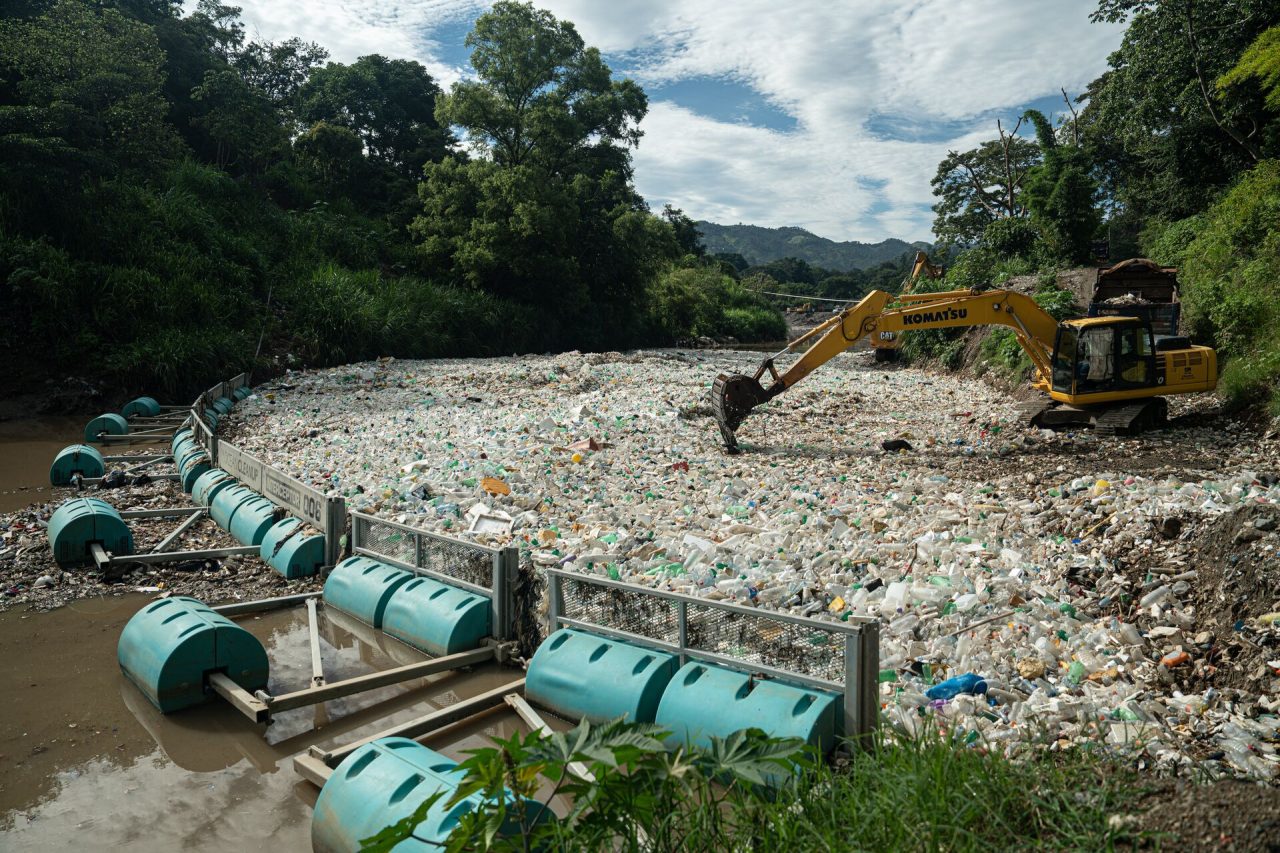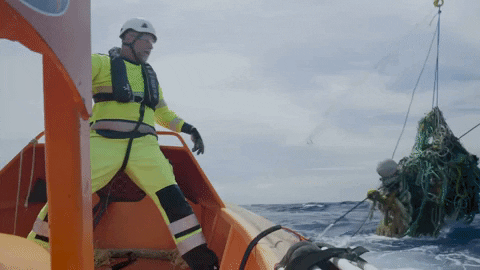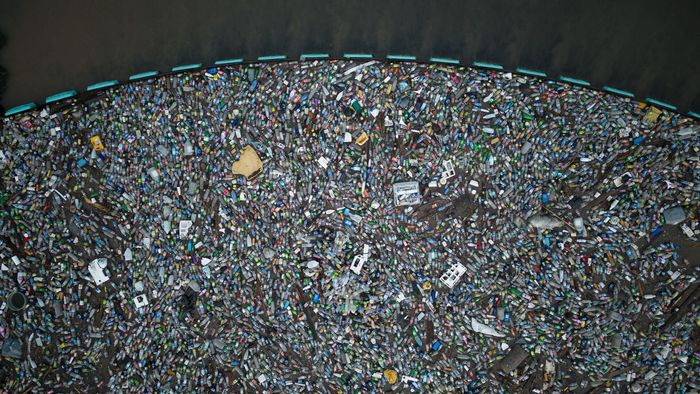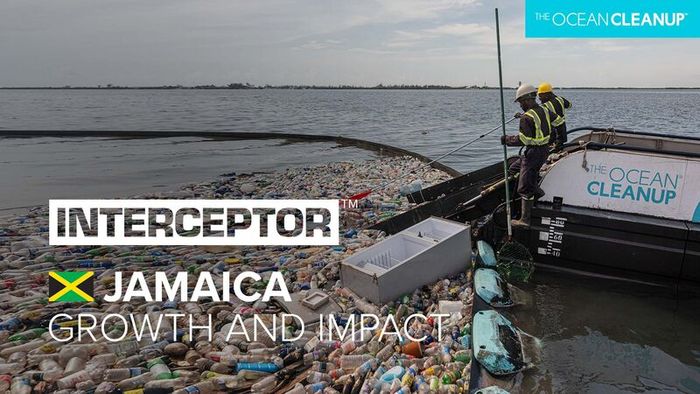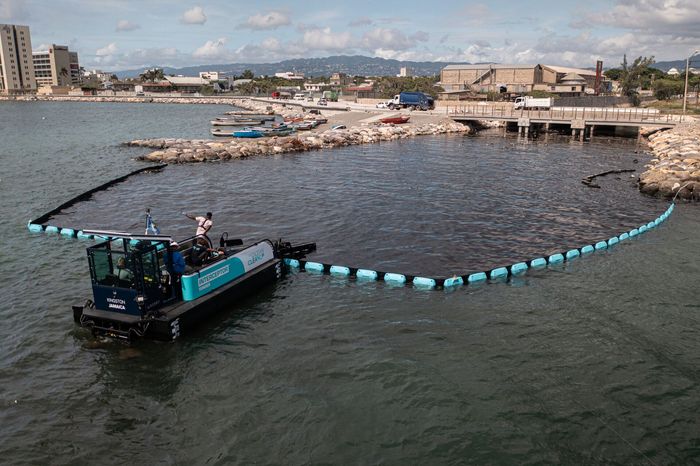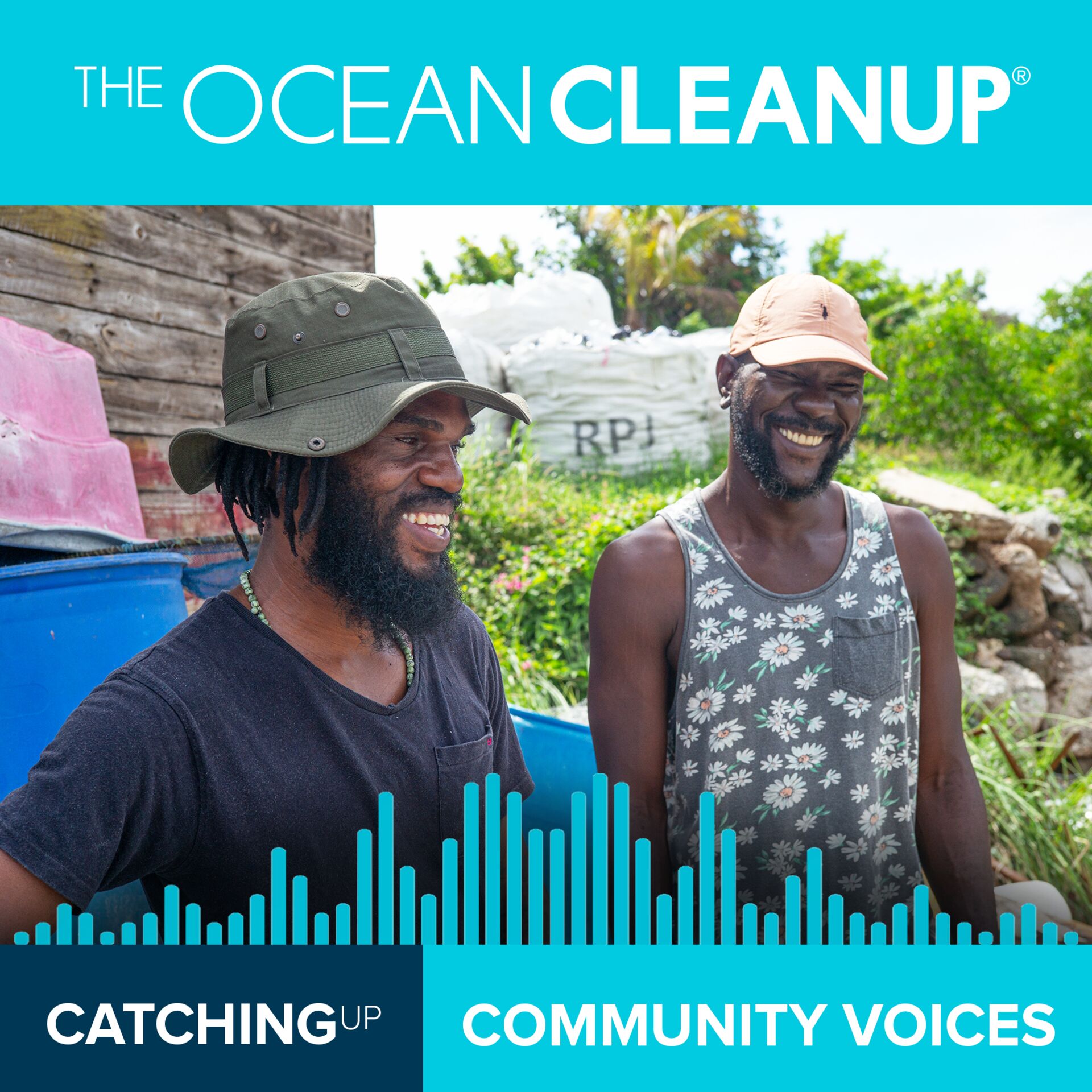
Rivers
Community Voices | Creating a Better Future
This month, our host, Dan van der Kooy, records the 50th episode of Catching Up in Kingston, Jamaica, sitting on a fishing boat with Jerome “Cliff” Clifford and Colin “Dean” Palmer. Cliff and Dean are two local fishermen from Seaview Gardens, a neighborhood along Sandy Gully in Kingston, Jamaica.
Their neighborhood is directly affected by the trash pouring out of the gully each day. Cliff and Dean share stories of what it was like prior to the pollution and discuss the importance of cleaning it up. They share their pride in being part of a major project like the new Interceptor solution and their desire to leave a better future for the local community, fishermen, and future generations.
We also hear about the community’s involvement in The Ocean Cleanup’s deployments in the area. Their goal is to preserve the environment, ensuring that future generations have somewhere to go fishing, something to eat, and a strong community. Right now, they’re making history to make sure there’s a future.
Thank you to all our listeners! We can’t believe we have recorded 50 episodes, and we wouldn’t have been able to do so without your support.
To stay up to date with our latest developments, subscribe to our newsletter below or follow us on social media: Facebook, Instagram, LinkedIn, YouTube, TikTok, X.
Transcript
Disclaimer
The transcript has been edited for easier reading, excluding filler words and repetitions, adapting grammar and sentence structure.
Intro - Cliff & Dean
Dan van der Kooy: Well, welcome to a very special episode of Catching Up. For those who listen to this, this has been a podcast that’s now going on its 50th episode, which I can’t believe. Fifty months I’ve been talking to people all over the world in this podcast, and I couldn’t think of a better way to spend it than with two fishermen from Seaview Gardens in Kingston, Jamaica, who I’ve known now not just weeks, not just months, but actually for years. Years I’ve been coming here and chatting with you guys here in Seaview. So, I want to let you guys introduce yourselves.
I’m going to start with you. Cliff, introduce yourself and tell me how did you start, how did you become a fisherman?
Jerome “Cliff” Clifford: Well, my name is Cliff. I’ve been living here for 37 years and started fishing with my dad. We used to go fishing just to talk, to inform me on the basic day-to-day life, to try to groom me to be a man. And then from there, the excitement of fishing really appealed to me. So, from there, we just ventured off into it more.
My godfather had a vessel, and he used to go out in the deep and catch a wild variety of things that I like, including lobster, and stuff like that. And I gained that interest from there, it manifested into this today. So, we’re grateful for everything that’s going on, and we’re looking forward to a great project.
Colin “Dean” Palmer: Hi. My name is Dean. I’m 40 years old. I’ve been fishing basically all my life. Started fishing with my dad, funny enough. At first, it was one of the most tasking things ever. Fourteen, fifteen years old, father waking me up at 3 o’clock in the morning to go to sea. But as I grew older, it was something I looked forward to because that was the time me and my dad spent together. Getting older, it just clicked. The sea is the second home to me. So, it was just natural. Plus, my father himself was a fisherman, so it was just natural. I guess it was in my blood to end up on the sea.
Seaview Gardens - A strong community dedicated to build a cleaner future
Dan van der Kooy: Perfect. And we’re in Seaview Gardens, which is where we’re about to deploy Interceptor 015 in the Sandy Gully. And like I said, normally for this podcast, I sit and talk to an engineer in Rotterdam or an operator in Guatemala or wherever, and that’s what we do. It’s to focus on the team at The Ocean Cleanup, but you guys are now part of the team at The Ocean Cleanup.
So, since it’s my podcast and I make the rules, you guys are my guests today. Tell me about this project that we’re all working on here in the Sandy Gully.
Jerome “Cliff” Clifford: This project here is a huge but a monster project. Even though we are inland, it’s like we’re out at sea. At sea, time and then, it’s a great look. It’s a good feeling to a lot of people. They may not come out as much and express their feelings, but a lot of people right now are looking forward to the end result because people who live here and depend on the fish that came from the ocean, are not finding them anymore. They have to venture out. They are happy. And we, as fishermen and neighbors, long-term neighbors, we are so grateful. It’s a huge project.
We’re excited. Like I said before, we’re very excited. Trust me. Can’t wait for the end result. We get up every day with the whole project in mind. Sometimes we forget to even eat breakfast. We just want everything to get done. So, it’s a huge project.
We’re grateful, and a lot of other people are grateful. I could speak for most because a lot of them come up to me and ask questions. So, what’s going to go there? So those tubes are for what? So those guys, who are them? So, the guys with the drone are for what? So, it’s like a lot of people are curious and, we have to inform them as we go along. That’s why we are in it because we know what it was, and we would like to see it go back to what it was, and we would like to do anything we can to make sure the job gets done. So, it’s like having a baby and wanting to nurse the baby too. That’s what it is for me. We can say that most people who are in the community understand.
Dan van der Kooy: Dean, how important is it to have the local fishermen, the local community, not only just to have a voice in it, but you guys are working on the project. How important is it to have the community involved for a project like this? That it’s not just people coming from Europe and taking it over. I mean, you’re hands-on.
Colin “Dean” Palmer: It’s very important for me because I remember the first day I encountered you guys. I was out on the wall and doing a little fishing. I was coming in and you guys were walking up, and I was actually passing you guys, and you stopped, and you said, “hey. You know, we’re thinking about doing some cleaning up in there. What do you know about the place?” And we started talking. So, at one point, I was basically in a mind frame to say, this is just talking, we got research, but nothing is not going to happen. Maybe when I’m dead before this has started or something like that, and to see after about 4 or 5 years, research is done and the project is actually coming to fruition, we’re very excited, and then to know that, yes, we have the community involved, not just the fishermen, but the community itself involved, for me, that would give the community not just a sense of pride, but also a sense of belonging. They could have something that they can cherish now. So, it’s like you’re giving them the foundation, and then it’s now for them to do the building. So, for the community, I think their stepping up should be when the project has ended and how we maintain and keep this going.
Dan van der Kooy: The thing that people don’t understand a lot of times in the many countries that we go to, everything has to go through a lot of hoops. There are the places where you can go to and be like, hey. You know what? It’s just simple. Just throw the Barricade across the water and stop the trash. But there’s permitting and there’s research and there’s a lot of other things that have to be done before you can do it, especially in something this big. Because this is a massive piece of water, and this is a massive boom.
Colin “Dean” Palmer: Remember, even after we put the boom there, the process of maintaining it is another thing.
Dan van der Kooy: And keeping it clean. Because once that trash builds up, then making sure that the constant…
Colin “Dean” Palmer: I can tell you, if the other booms are getting cleaned, say, every 2 weeks, this will need to be cleaned every week. Because that’s the amount of garbage that comes down from that tributary. Especially in the rainy season. You saw how it was the other day, and the rain fell for a couple of hours. So, imagine when we have, like, a full-blown storm on us.
Dan van der Kooy: Yeah. This is also something that has to be brought up and remembered throughout this. Nothing’s perfect. You know, this is the first time this stuff has ever been done, it’s not like we have done a thousand of these and we say, this is exactly how this works. So, you may see things happen that may break, overflow, underflow, but I guarantee there are brains in the Netherlands right now, that are working on the next level, the next steps. So don’t ever get discouraged if you see it and you’re like this thing is not working. That’s why we’re photographing everything and that’s why we’re monitoring everything, and there’s always people here. We have the Grace Kennedy Foundation here; we have Clean Harbors Jamaica. Those are our partners on this, and they’re constantly going to be monitoring this and open to feedback. We want to hear. So, that’s why you all are so important, the fishermen, the people that live in these communities, because you’re going to pass on to us: “this isn’t working”. So, we give suggestions, because I promise again, the brains that that work on this, the engineers and the researchers, the people that that put this stuff together, they’ll fix it, hundred percent. Describe Seaview Gardens?
Colin “Dean” Palmer: Seaview Gardens is basically Jamaica in one word out of many one people. The home of most of the biggest artists that ever came out of Jamaica, Shabba Ranks, Bounty Killer, Elephant Man, Scare Dem Crew, Dexta Daps, Nick. You name them, right here. Usain Bolt loves here. This is like Usain’s second home. Every time Usain is here, you’ll see Usain when you check it. When Usain Bolt comes to Seaview, he walks up and down this place like it’s his own.
Jerome “Cliff” Clifford: I’ve met Steven Segal out here. Eddie Murphy came here.
Colin “Dean” Palmer: Seaview Gardens is everything.
Dan van der Kooy: What’s the community like? What’s the vibe?
Colin “Dean” Palmer: We’re always chilling. There’s always a party going on somewhere in Seaview. There’s always a vibe somewhere.
Jerome “Cliff” Clifford: I think this is the best community ever, no disrespect to nowhere else in Jamaica. We have a mixed diversity, because a lot of people here are from different communities. A lot of us have a cool vibe. We’re from anybody, and we just need to love to. We deal with love, you know?
Colin “Dean” Palmer: It’s like, see if you have that type of hypnotic feeling where you’ll come in, you’ll kick back, you’ll experience the day, and you’ll be like. I gotta come here tomorrow. And then tomorrow when you come, what you experienced yesterday is something totally different you get tomorrow.
Sandy Gully - The Sandy "Monster"
Dan van der Kooy: But let’s talk a minute about the Sandy Gully because we put barriers and barricades in Mountain View and Raytown and Barnes and Kingston Pen, and these are well-defined easy gullies to deal with, but we have a name for this, the sandy monster. This thing is a monster. There’s a forest growing in this gully. So, there’s all this stuff that we have to deal with to for the technology side of this. But just to people that don’t know how big the Sandy Gully is and not to mention being out here during a storm and seeing how powerful this thing is. Describe the sandy gully?
Jerome “Cliff” Clifford: Sandy gully is a monster. You don’t want to get caught in that during a rain, never have to mention storm. Just raining alone, you don’t want to get caught in sandy gully. Because by the time somebody finds out you’re missing, you’re really missing. Gone. You know?
Dan van der Kooy: So, but how important is the sandy gully to this community? How important is the water to this community on the fisherman side?
Colin “Dean” Palmer: It is life for a lot of fishermen. Not just in Seaview, but we have fishermen from Huntsville that uses this water as well. For the shrimp fishermen, this is where they catch their shrimp. You have guys that specialize in catching their tarpons, it is here, the snooks. This is basically the livelihood of a lot of fishermen. Right here in the community. This is somewhere you’re broke, you ain’t got no money, you need something to eat, you throw a line, and you catch a fish. That’s dinner. So, it’s very important to a lot of people, not just fishermen, but the community itself. This community if I go out there and I catch 5 pounds of shrimp, I’m sending it right back in this community. I catch snook, it’s back right here. So, at the level it’s at right now, I hate where it’s at, and to know that this is what we survive out of, yeah, we need to clean it so that at least we know we are getting something healthy to eat.
Jerome “Cliff” Clifford: It’s very important. The ocean.
Colin “Dean” Palmer: This is the life of the earth itself, you know.
Jerome “Cliff” Clifford: Water is life.
Colin “Dean” Palmer: If we don’t take care of it, then what will we have? If the ocean goes, the world is done, and we have to start from somewhere, guys. Please recycle, people really have to think what would this world be without fish in the ocean. Everything comes from the ocean. So, if we don’t take care of it, we’re basically signing our own death warrant.
It is everyone's responsibility
Dan van der Kooy: It’s so true. And we do these projects all over the world. We’re in Malaysia. We’re in Thailand. We’re in Guatemala. And something that I always like to get across that is very important to people listening, it’s not always countries like Malaysia or Guatemala or wherever. We also have an interceptor project in Los Angeles, California. So, this is a global problem. I mean, this is everywhere, and what do we need to do as humans? Like, as the human species everywhere on the world, what do we need to do?
Jerome “Cliff” Clifford: People worldwide, if you’re here and when you do here, it’s simple. Dispose of all your garbage properly, dispose of your garbage properly, practice recycling, get the necessary garbage cans and stuff, and don’t turn to dumping it in the gully or the ocean because it will build up and it will affect you eventually. It may not affect you the same moment you do the dumping, but eventually, it will affect you, and you have to also look out for the future generation. Don’t look out for yourself, try to develop a little compassion for the earth. Because we are here on this earth to also protect the earth. Likewise, the earth provides food and stuff for us. So, we have to take the initiative to start disposing of our garbage the proper way. Don’t revert to dumping in the gully or the ocean. Start at each one and remind one, and it will grow from there.
Past, Present ....
Dan van der Kooy: And one of the things I think is so cool as I’m watching you all do this is the first time, I pulled up here, when the first two pieces arrived, y’all are sitting there in the boat, you’re doing your work or whatever. There were, like, four or five kids from Seaview Garden sitting there watching you guys and what you’re doing with extreme interest, they’re interested in it. So, you guys being sort of these, I hate to use the word elders of the community, but they’re looking up to you guys. They’re seeing this, and they’re saying, “okay. These guys are doing this for us.” What kind of spark is that?
Colin “Dean” Palmer: It’s actually a great spark because as you saw, they’re young kids and their interest in fishing is phenomenal. At times, we have to argue with them because they’ll come, they’ll take our lines, they’ll take away our hooks, because they want to go and fish. So, it is important for us, who are basically the elders, to ensure that they have somewhere to go and fish. We have that memory where we could tell you, oh, when we were kids, what it was like.
Dan van der Kooy: What was it like?
Colin “Dean” Palmer: This was the spot. We caught everything here. Fishermen that are older than us can tell you. They had no need to go to the open sea to find their food. They could fish right in here. They’ll catch their snappers, they’ll catch their jacks, they’ll catch barracudas, they’ll catch kingfish. They’ll catch every species right inside here. Because this used to be somewhat of a sanctuary for the fish where they would come and breed. In fact, the jacks used to be in here like crazy. One of our elders, Bonnie, he could tell you, when the mullets came in here, you would lose half your net because of the mass amount of mullet that would run into your net.
Jerome “Cliff” Clifford: I remember one day I saw a school of jack and ran to get Mister Frank, and he came and caught like seven of them, and he gave me a slice, and that slice was enough to feed five people.
Colin “Dean” Palmer: So, we want to get it back to that where these kids can literally come out through a line, catch a fish, feel good. So that richness is just the pollution that is basically killing it.
Dan van der Kooy: When did it start to switch? What was it? Can you remember, like, a certain moment, a year, a time period where all of a sudden, the mullet wasn’t coming into the bay anymore or you were having to start fishing further out to sea?
Colin “Dean” Palmer: I would say things really started to change from about in the early late nineties, going up to the early 2000s. The flow of garbage started to come down heavier. You noticed the color of the water started to change. We have not seen our green or blue water from about 94, 95. You would literally pull up here and you’re literally out at the seaside. You’re getting that blue and the shallow parts, you’ll get that green ocean water. Fully salted. Now it’s a mixture of muck. The factories are lifting out their waste.
Dan van der Kooy: So then how does it feel? Like, you two being here, Seaview Gardens, 37 years, 40 years in this community, and you guys are at the forefront of making a massive change right now? You’re going to get to witness that you’re doing your part. You’re doing everything you can do. How does that make you guys feel as fishermen from Seaview Gardens?
Colin “Dean” Palmer: I feel good because I’m doing something I might not see the end result of this, because even after the project is finished, it’s still going to take years for everything to really get back. It might not be done within my lifetime, but at least I know I’m setting something for the future. My kids could come and enjoy it. Their kids could come and enjoy. So, you have to think in the minds that you’re not doing it for you, you’re doing it to preserve what you came and see.
Dan van der Kooy: I agree, I go places, and I see things and I say, in my lifetime, it will not be solved, as unfortunate as it is. But when the history books come out in the next generation, we’re like the ones that landed on the moon. We were there for the beginning of it, we planted the seed, and now we have the forest.
Colin “Dean” Palmer: Yeah. Because when you really look at it, something like this would give every single person in the community that little boost. I’m bragging to say,that I helped to get this back to what it was.
Dan van der Kooy: And I love that you guys have that mentality because that it’s so important because it is all about that next generation. About seeing it through your lifetime.
Colin “Dean” Palmer: Preserving it for the future.
Dan van der Kooy: Yeah. Exactly. Exactly.
Jerome “Cliff” Clifford: I would like my kids from here and say, you know, this is where my dad grew up and, you know, actually experience something.
Colin “Dean” Palmer: Because, hey, if I’m going to tell my son that I caught a tarpon in this water weighing 200 pounds, I would love for one day they come and say, “hey, my dad caught a 200-pounder, I’m going to try to catch a 250-pounder, I’m going to try to catch a 300-pounder in the same spot.”
Jerome “Cliff” Clifford: This water here will pass a lot of time, and this water had a lot of fun moments with my landline, trust me, the best times. I told so many stories about this water.
Colin “Dean” Palmer: We have crazy memories.
Jerome “Cliff” Clifford: This water here is very popular.
Colin “Dean” Palmer: Even now that it’s at this stage, we still have crazy memories.
Jerome “Cliff” Clifford: With the water here.
Colin “Dean” Palmer: We’ll catch fish, and we’ll just roast them right there, boom, and when you look, everyone is coming down and we’re just having a vibe.
The "Jamaican Vibe"
Dan van der Kooy: I love that. So let let’s talk about this a second, this Jamaican vibe. Because this is so true and this is not just in Seaview Gardens, there’s something unique to Jamaica. Tell me about this Jamaican vibe that you all have.
Colin “Dean” Palmer: There’s a popular saying, “Ye man, no worries.” Honestly, life is fun in Jamaica. Like, I can say that because I’ve lived abroad for12 years and trust me, there’s no place like home. The type of fun, the type of vibe you have here, you can’t find it nowhere else. We can get up in the morning, we don’t know we don’t have any plans, and someone might call and say, “hey. I’m killing a pig”. Or the guys and say, “hey. We’re going to catch some fish, start that fire”. It’s a vibe.
Dan van der Kooy: Out of curiosity, what is the relationship like between the different fishing communities around here? We spend a lot of time in Raytown because we also have one there. So, I hang out there a lot as well, and I get to know the fishermen there. Do you all communicate as fishermen and say, “hey, we’re this. We’re seeing this, or we’re not catching this or whatever. What are you guys seeing?”
Colin “Dean” Palmer: Yeah, man. The fishing community in Jamaica is actually very close-knit. It doesn’t matter what beach you’re from; you’re a fisherman, you’re a brother. So, we correspond in saying where the fishes are biting, where the weather is good, and stuff like that. So, we do communicate a lot, we are always on other beaches, we have friends on other beaches, they come here, come check us also. So, it’s a very tight-knit close fishing community. We might not even know each other’s names, but we know each other’s boats. So, I’ll see your boat at sea, I’ll pull up, and I’ll address you by the name of your boat, and we’ll be friends from that. So, if I even see you at sea having problems, it’s the least for me to ensure to get you home. That’s how close we are as a fishing community. It doesn’t matter where you’re from. You could be fishing from Saint Thomas, and your boat is in Kingston fishing, if you have problems, we’re going to take care of you just the same. Jamaicans have this family mentality kind of thing; we don’t have to be family for me to give you food or something like that. Hey, I could buy the meat, you could buy the rice, we could go at his house to cook, he will buy the sugar, he will get the Kool-Aid. We kick back, we eat, we drink, we laugh, we talk, we play some dominoes, we play some cards, we just have a vibe.
Jerome “Cliff” Clifford: I think we’re a bit more grounded here because mainly to us, we’ve had a roster culture too. We just do what we can and what we can’t, we leave that.
Colin “Dean” Palmer: If a Jamaican tells us I’m so come, look for him for, like, about 3, 4 hours later because that’s just us. They say we are always late for everything, but it’s not late, we just have time for we have a rush for. So, you just take your time, and you just let day flow. You get me if my tell is I’m a so come, soon come didn’t give you a specific time.
Dan van der Kooy: Okay. So that explains everything with this part.
Colin “Dean” Palmer: So, I must say later could be next week. It’s just the next time I see you is later. So, you might see me in 5 minutes. You might see me in 5 hours. You might see me in 5 days.
Dan van der Kooy: And the funny thing is it always does seem to come together. It always comes together. I come with this mentality of deadlines and then we gotta get this going. And then at the end of the day, I go to bed, and I’ve worried. And it still got done.
Colin “Dean” Palmer: That is, it.
Dan van der Kooy: And you didn’t work.
Colin “Dean” Palmer: Exactly. It’s…
Dan van der Kooy: The perfect, perfect thing.
Colin “Dean” Palmer: We do things in our own time.
... Future
Dan van der Kooy: Yeah. I see it. And the last thing that I have for you all is, like, now that this is happening and it’s exciting, and you mentioned something to me earlier, Cliff, that, like, the name Seaview says it all, that’s why you all love to live here. And we know the passion that you all have with this. What do you see the future like here in Seaview?
Jerome “Cliff” Clifford: Seaview? Well, for me, ever since I was a boy, probably 11, 12 years, where I always envisioned that over here will be similar to Port Royal or even more than Harbor. I have eateries on the do the cafes, you know, maybe even a jogging pad. So that’s what I see for Seaview in the future, maybe the next 10, 15 years because a lot of the guys here that have grown up decided not to leave and decided working hard and saving, reinvesting in the community. I could see we have a double studio up there, we have a party lawn, we have a car wash, we have a little meat shop grocery store up the top there. So it’s like a lot of things coming out. Before we had our stable up there, one of the guys up there who own our assist. We have an alignment stand with a garage, pharmacy, with the jar enterprise. So there’s a lot of things changing being made inside the community, but on the ocean now, that’s where the big difference is needed, and that’s where we’re working on now, and like I said before, it may not show my face, but I’m super excited.
Colin “Dean” Palmer: Well, for me, the future that I see is… A lot of guys have been coming across wanting to get their fishing license, fishing IDs, and then I I’m seeing a lot of guys coming back from abroad, buying boats, getting their boats registered and stuff. With this project going on, in the future I’m seeing is that once this is done, the dream I have to Seaview as a fishing village will come to fruition. Because it’s like, I’m seeing so much youngsters coming in “ Hey, how do I get my ID?” I’ve carried so much of them already down to fisheries to get their IDs and their license. So I’m like, this is just a joy. The other day, one came and he said he has a boat in Old Harbour. I’m like, Let’s go get it. So for me, that’s just a joy because the more I see step out of Seaview, step on the sea, it just fills my heart. I just love to see people enjoying the ocean because, like, the ocean is the best place ever.
Dan van der Kooy: Beautifully said, man. Well, thank you all again, and everybody listening, thank you. Thank you for supporting us. Thank you for following everything that we’re doing here in Jamaica, but all over the world. Keep listening. As I mentioned at the beginning, this is episode number 50 of catching up. I still can’t believe that I’ve done 50 months of something…
Jerome “Cliff” Clifford: Appreciate you being here too, taking the time away from your family and everything, you know. Respect…
Dan van der Kooy: I love meeting guys like you, I do this everywhere. It’s the coolest part of my job is getting to sit with guys like you, and women, and meet them and travel and see these places, and now as we’re starting to progress, we’re starting to see impact, which makes it even cooler. So that’s why I can’t wait to come back here and sit on a boat with Dean.
Jerome “Cliff” Clifford: Looking forward, much respect to the guys in the Netherlands also. Keep doing the good work. Hopefully, we collaborate sometime where you guys could come out and enjoy the sunshine.
Colin “Dean” Palmer: Yeah. We roast some fish.
Dan van der Kooy: fish, drink some red stripe. Yeah. That’s it. The Jamaican style.
Colin “Dean” Palmer: Much love, you know.
Dan van der Kooy: Well, thanks everybody.
Jerome “Cliff” Clifford: Yeah, man. Much love.
Dan van der Kooy: Keep going, and you got all of our support. Take care, guys.
Jerome “Cliff” Clifford: Much love.
Dan van der Kooy: Okay. That was awesome. Yeah. What a conversation.
